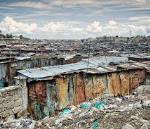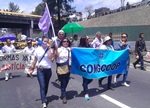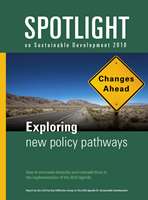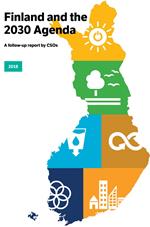Social Watch news
Published on Thu, 2018-12-06 18:25
Iraqi Women Network proposes to Iraqi leadership the creation of the National Council for Women’s Empowerment, as an independent national mechanism for women’s affairs in Iraq. The proposal was discussed with the President Barham Saleh. Since long time, Iraqi Women Network has been advocating to create an active partnership between various state authorities and along with CSO’s, media and gender studies and research centres to improve the status of women in Iraq and increase the role of women in realising stability, security, peace building, justice and development.
|
Published on Wed, 2018-11-21 10:29
Food is the axis of the civil society report on the SDGs in Nepal, where “transnational corporations are grabbing land, monopolizing seeds and food markets, and marginalizing small holder farmers more”. As visible evidence, “now in Nepal packed foods are common not only in the urban townships but also in remote and hard to reach areas, replacing indigenous food consumption patterns. Farmers rely heavily on seed markets rather than preserving their own seeds, which was common practices in Nepal even a few years back.”
Food quality is degrading as farmers are using chemical pesticides and fertilizers. This creates health problems, and even when food availability has improved, the supply is inadequate to meet the surging food demand. Cereal import dependency has been rising, while Nepal's capacity to export food has been falling. This can also be linked with the huge out-migration among youth for work in foreign lands in the absence of opportunities in the country.
|
Published on Wed, 2018-11-21 10:26
In the United Kingdom, a consultation process coordinated by the UK network of Stakeholders for Sustainable Development (UKSSD) concludes that “inequality is projected to rise in the coming years”. Paradoxically, the unemployment rate is reaching an historical low, but “at the same time, tax and social security cuts introduced since 2012 have had a particularly severe effect on people on lower incomes. Black and ethnic minority households, families with at least one disabled member, and lone parents (who are overwhelmingly women) have suffered disproportionately”.
A member of the network, Just Fair, led the drafting of the civil society chapter on SDG 10 on the reduction of inequality at the national level and highlights the fact that, thanks to the Equality Act of 2010, “authorities gather and transparently report useful disaggregated data”. Yet, successive governments have failed to implement this Act. The duty is in force in Scotland since April 2018, Wales has the power to follow suit, some councils are voluntarily implementing it and 78 Members of Parliament from five different parties are calling on the government to bring the duty into effect.
|
Published on Fri, 2018-11-16 06:56
A strong and dynamic World Health Organisation (WHO) is critical for the achievement of the SDGs, especially SDG 3 on health and well-being. The WHO constitution mandates the organization "to act as the directing and co-ordinating authority on international health work”. However, its ability to fulfil this mandate is circumscribed by the nature of its financial resources. WHO’s biennial budget for 2018-2019 is US$ 4.42 billion, 2 just over a quarter of the total sales of the top-selling medicine Humira (Adalimumab) in 2016 (US$ 16.08 billion).
In part this is because many of the organization’s donors share the view that WHO may not need a huge budget to carry out its constitutional mandate, which mainly consists of setting norms and standards in the area of public health. However, a large part of the organization’s spending in 2016-2017 went to activities related to service delivery rather than to norms and standard setting. For example, US$ 1.16 billion (25.67%) was spent on its polio eradication programme.
|
Published on Wed, 2018-11-07 17:44

|
In Kenya the NGO SODNET reports that “the widening gap between the rich and the poor continues to undermine confidence in the institutions of democratic economic governance and, alongside it, the imperative of social cohesion as a condition for sustainable development”. According to Edward Oyugi, J. Ocholla and Mwaura Kaara “Kenya still lives uneasily with a colonial past and its legacy of unequal development, arising from acute asymmetry of power relations associated with the continuation of a colonial system that had merely engaged a strategic retreat gear against the false belief that the post-colonial dispensation marked a systemic transformation of the colonial societies.” The report concludes that democracy and sustainable development remain “a dream” because “the culture and practice of corruption has grown deep and enduring roots in Kenyan society and become endemic” and allows for concentration of wealth within the ruling circles. The political and bureaucratic leadership benefit from it “and the existing governance institutions either kick the can down the road or lack both the will and capacity to stop them from doing so”.
|
Published on Tue, 2018-11-06 00:00
In France, a High Level Steering Committee for the implementation of the SDGs held its first meeting in April 2018 as a forum to debate and collectively build, with public and private actors, a ‘roadmap’ to be issued in the fall of 2019.This move was applauded by the ATD Fourth World Movement for being inclusive, but also criticized as “coming late”.
ATD Fourth World finds “very little effort to synergize the various objectives, and "not a major concern" for poverty in France.
The Movement hopes “that the enforcement of each SDG reaches the poorest, on the national territory as well as in the international development cooperation by France” and it campaigns in particular on the issue of unemployment (currently 9 percent in France) demanding “access to work as a right, just as the right to education or the right to social security”.
|
Published on Fri, 2018-11-02 18:09
Three years into the implementation of the 2030 Agenda for Sustainable Development, concerns continue about stalled indicators, missing indicators and proliferating and potentially competing data sources, which makes it difficult to assess progress (see GPW Briefings #22: The Ups and Downs of Tiers: measuring SDG progress; #23: SDG Indicators-the forest is missing).
Initiatives abound in the shifting terrain of the generation, validation and use of data to satisfy the demands of a growing market of players. In addition to the work of the UN mandated Inter-agency and Expert Group on SDG Indicators (IAEG-SDGs), these concerns and challenges have drawn the attention of a number of official statisticians and practitioners.
|
Published on Mon, 2018-10-22 12:09
KEPA; the Finnish platform of civil society organizations, worries about the extraterritorial impact of Finland's production and consumption patterns.
“Almost half of Finland's water footprint is caused by production chains outside Finland” they argue as an example. Kepa reports that “there is no reliable or even partially comprehensive information available in Finland on the external impacts of Finnish consumption, i.e., how we exploit natural resources outside of our own country”. The Finnish Ministry of Finance initiated an assessment of the national budget from a sustainable development perspective. However, the initial work is judged “quite modest”. The budget proposal for 2019 is going to be estimated mainly from the climate change perspective, and will focus on the plans for Finland to become carbon neutral after having reached a historic high in carbon emissions in 2017. Kepa considers it “necessary to widen the approach of taking sustainable development into account in the budget planning” to cover other issues and “to look courageously at tax support for fossil fuels and other activities that may even conflict with sustainable development.”
|
Published on Mon, 2018-10-22 12:06

Photo: CONGCOOP
|
In Guatemala the main complaint about the State is its absence. “We have the sensation that there is no government,” reports Helmer Velazquez, director of the cooperatives and NGOs association Congcoop, “because taxes are so low and the 'state captors' don't even pay them, thanks to tax exemptions or plain avoidance, which leaves the exploitation of natural resources as the only funding source.” “This wouldn't be a problem if we didn't have seven million people living in poverty: Half of the population! And poverty is extreme for three million of them. Very calm, the government reported in 2017 ‘institutional progress’ by linking the SDGs with the national development plan K'atun 2032. In substantive terms, nothing.”
|
Published on Mon, 2018-10-22 11:56
There is no doubt that social protection is a key instrument to end poverty and to give people access to opportunities for a self-determined life in dignity. National social protection systems can also contribute to achieving other SDGs, including food security, good health, decent work, gender equality, reduced inequality and cohesive communities.
Even for countries that have the political will to close the gap and the organizational capacity to implement the required policies, a major challenge is to mobilize and maintain the necessary resources to cover the cost in a sustainable way. Social protection spending is not a short-term effort but needs to be planned and guaranteed for the indefinite future.
|
SUSCRIBE TO OUR NEWSLETTER
Submit

|










